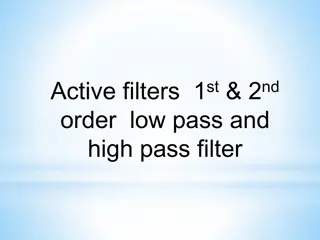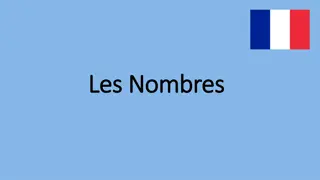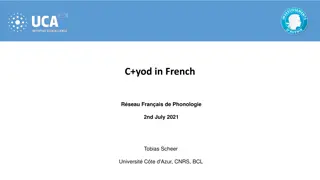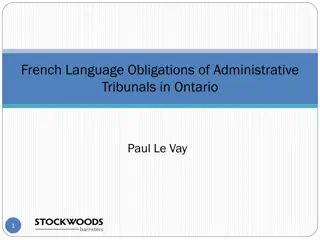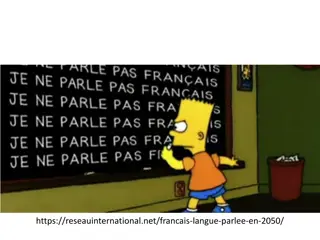Learning Le Passé Composé in French
Explore how to recognize, form, and use Le Passé Composé, a tense used to talk about completed actions in the past in French. Discover the two-verb structure, learn about the auxiliary verb "avoir," and master the formation of past participles. Practice identifying when to use Le Passé Composé through example sentences.
Download Presentation

Please find below an Image/Link to download the presentation.
The content on the website is provided AS IS for your information and personal use only. It may not be sold, licensed, or shared on other websites without obtaining consent from the author.If you encounter any issues during the download, it is possible that the publisher has removed the file from their server.
You are allowed to download the files provided on this website for personal or commercial use, subject to the condition that they are used lawfully. All files are the property of their respective owners.
The content on the website is provided AS IS for your information and personal use only. It may not be sold, licensed, or shared on other websites without obtaining consent from the author.
E N D
Presentation Transcript
What you will learn What you will learn How to recognise How to recognise le lepass and its equivalent in English and its equivalent in English How to form How to form le lepass How to use the correct ending for the past How to use the correct ending for the past participle participle pass compos compos in French in French pass compos compos using using avoir avoir 2
Le pass Le pass compos compos When we talk about things that happened in the past, we use the past tense. One of these tenses in French is called le pass compos . We use this tense to talk about completed actions in the past. In English, we can talk about a completed action in two ways: I ate I have eaten In French, le pass compos covers both senses: J ai mang Don t you think the French version,j ai mang , looks similar to one of the English versions? 3
Looking at jai mang you can see that two verbs are used to form the tense. Verb 1 = avoir(the auxiliary verb) in the present tense. Verb 2 = mang , which is the past participle form of manger. Take a look at these sentences and see which ones would be translated using lepass compos : 1. I chatted with my friend last Friday. 2. They watch a film every weekend. 3. I have eaten my dinner. 4. We will be late for the party. It s important to recognise the tense in English, so that you know when to use le pass compose in French. Remember: it is a two-verb tense. 4
Lets look at verb 1. This verb can be either avoir or tre. For the moment, we will work with avoir. Only a small number of verbs use tre in le pass compos : all others use avoir. Let s revise the present tense of avoir. J Tu Il/elle/on Nous Vous Ills/elles ai as a avons avez ont Remember your pronunciation: nous [z]avons, vous [z]avez, ils/elles [z]ont 5
Now lets look at verb 2. This is the past participle. To form the past participle, we need to know if the verb has a regular or irregular past participle. If it is a regular verb, we follow these rules: -er verbs change their ending to - bavarder J ai bavard -ir verbs change their ending to -i finir J ai fini -re verbs change their ending to -u vendre J ai vendu We will look at the past participles of irregular verbs later on. 6
Lets go through the list for forming lepass compos: 1. Le pass compos is a two-verb tense. 2. Verb 1 is either avoir or tre. (So far, we have learned only about avoir.) 3. Check that you have the correct part of avoir in the present. 4. Make sure that you have formed Verb 2 the past participle correctly. The regular past participle endings are: -er -ir -re - -i -u 7
Mets les verbes au pass compos. 1. Je (regarder) R ponse : J ai regard 2. Nous (aimer) R ponse : Nous avons aim 3. Ils (finir) R ponse : Ils ont fini 4. Elle (attendre) R ponse : Elle a attendu 5. Tu (rougir) R ponse : Tu as rougi 6. Elles (choisir) R ponse : Elles ont choisi 7. On (manger) R ponse : On a mang 8. Vous (vendre) R ponse : Vous avez vendu 8
Can you ... ? Can you ... ? Recognise Recognise le lepass equivalent in English equivalent in English Form Form le lepass pass compos Use the correct ending for the past participle Use the correct ending for the past participle pass compos compos in French and its in French and its compos using using avoir avoir 9











